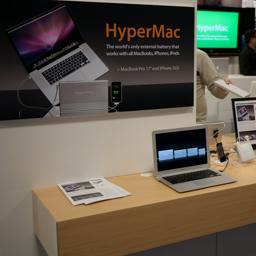One of my bosses got a Kindle 2 a few months ago, and was wondering how an avowed gadget lover such as myself did not have one already. I am perfectly comfortable reading books in electronic form on the small screens of PDAs or phones, but I have little interest in carrying yet another device with its bevy of chargers and accessories, so I just humored him. As far as I am concerned, the Apple iPad pretty much killed the e-reader market. E-ink technology has a place in digital signage, but a general-purpose computing device with Internet connectivity like the iPad wins over a unitasker any day.
My main objection to commercial e-books as they are mooted today is digital rights management. e-books cannot be resold or even given to family members. Even if DRM were acceptable, the value of a restricted e-books is a fraction of the value of a real book, but pricing today is much higher, despite massively lower costs of production, and short-sighted publishers want to take them even higher, to the same levels as hardbacks.
All tech companies fall somewhere on a spectrum of evil. Microsoft is on the bumbling side—their products are inferior and their marketing practices sharp, to say the least, but they are a fairly open company when it comes to developers using their platform, and Bill Gates is a modern day Robin Hood of sorts, taking from rich Westerners and giving to the poor in the Third World. Apple embodies the seductive dark side—superior products but a company that has no compuction in stabbing developers in the back, and with a demonstrated penchant for control freakery as shown with the iPhone App Store. Google is on the undecided side, ruthlessly violating privacy, but still capable of the odd principled gesture such as facing down Chinese censors.
Amazon as a company lies quite far on this spectrum. Good customer service does not excuse their behavior:
- Jeff Bezos is personally listed as an inventor on the obviously frivolous “one click” patent and has been using it to extort royalties and stymie competitors.
- At one point they removed all gay themed books from their search listings by classifying them. Faced with a firestorm of controversy, they unconvincingly claimed it was an operator error. Why do they have a bulk blacklisting facility in the first place?
- In an example of life imitating art, they pulled e-book copies of Orwell’s “Nineteen Eighty Four” from Kindle users who had paid for them. Apparently, they had never bothered to check if they had the rights to sell them. The simple fact Amazon has the power to pull books back from electronic bookshelves is unacceptable.
- They are trying to leverage their dominant position in online book sales to monopolize print-on-demand publishing by refusing to carry books not published by their own on-demand imprint, BookSurge, even though the latter is higher priced than competition and has serious quality issues.
- This is only the tip of the iceberg. Publishers speak in hushed tones about Amazon’s thuggish “negotiating” tactics, but never publicly out of fear of retaliation.
Since the launch of the Kindle, which is estimated to have 70% market share in e-readers, Amazon has been trying to leverage its market power in paper book sales to corner the market in e-books. One of the prongs in their strategy is to keep the legacy model where the publisher treats the e-book store like a dead-tree book reseller, rather than a model and revenue share more in line with the true costs of e-books (which are obviously much lower than for physical books, as the bandwidth required is piddling).
Apple’s iPad and its associated iBooks store has changed the way the debate is framed, and offers publishers an attractive agency model to counter Amazon’s diktat. It is not surprising that five of the big six publishers (all but Random House) signed up for the iBooks store.
Last Friday, in an escalation of mind-boggling arrogance, Amazon decided to punish Macmillan, the smallest and weakest of the big six (at least in the US) by withdrawing every Macmillan book from sale, including paper books, not just e-books. Among others books by Macmillan affiliate Tor, the leading label in Science Fiction and Fantasy, are not available for sale by Amazon (although they are still available from third-party sellers via Amazon’s site). Essentially Amazon is trying to use its dominance in printed book sales to twist Macmillan’s arm. As far as I am concerned, this is racketeering.
Disclaimer: my wife used to work for Macmillan in the UK. Not that it matters, Amazon’s behavior would be just as reprehensible with any other publisher.
I do not approve of the publishing industry’s doomed attempts to impose premium pricing on e-books, or their attempts to impose unacceptable DRM, but customers are perfectly capable of voting with their feet, as I do, and a middleman like Amazon behaving this way is intolerable. Booksellers censoring books or limiting supply is not an innocuous act. Norman Spinrad is in self-imposed exile in Paris because B. Dalton and Waldenbooks, the dominant booksellers in the 80s, would not sell his more controversial books (like Journals of the Plague Years) out of fear of offending conservative audiences in the Bible Belt.
Small independent bookstores are failing everywhere, and even the large Barnes & Noble and Borders chains are in dire straits. A company like Amazon with a demonstrated history of abusing its market power cannot be permitted to continue. I always buy my SFF books from the lovely Borderlands Books in any case, and my classical CDs from Arkiv Music, but I will henceforth abstain from buying books from Amazon altogether.
As for the Kindle, it can go to hell. I would not take one if they gave it to me for free.
Update (2010-02-04):
Like the SFWA, I replaced all the Amazon links on this site to Indiebound, a website that helps support independent booksellers.
Update (2014-05-28):
They are employing their racketeering tactics again, this time against Hachette.











